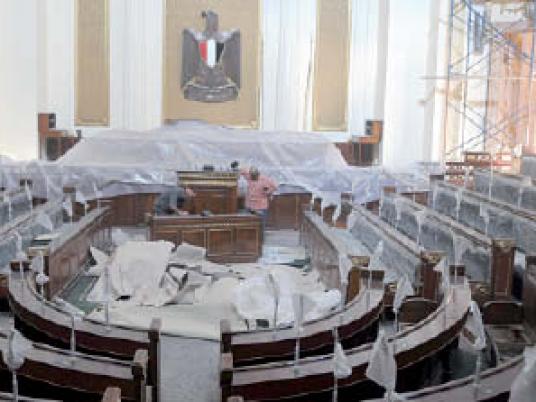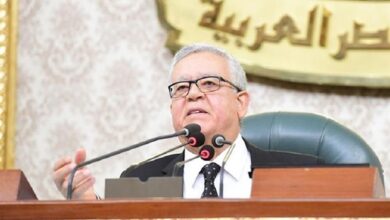
The parliamentary elections law, currently being debated in the Shura Council, which has legislative powers until parliamentary elections, is marking another juncture in the ongoing rift between Islamist and civil groups.
Forces in opposition to the Islamists are already slamming what has been disclosed of the draft law, for perpetuating the problems in the previous law and for potentially contradicting some constitutional principles.
The previous law was issued by the Supreme Council of the Armed Forces last year and led to the dissolution of Parliament. The Supreme Constitutional Court ruled against Parliament on 14 June, stating that the law does not allow for independent candidates to run on two-thirds of the seats allocated for party lists which violated the constitutional principle of equal opportunity.
The national dialogue, initiated by President Mohamed Morsy and led by resigned Vice President Mahmoud Mekky and Islamist scholar Mohamed Selim al-Awa, announced its proposed amendments to the elections law earlier this month.
The legislative committee within the Shoura Council has approved most of the contested articles of the law during the intensive sessions it has held in recent weeks. After it is finalized, the General Assembly is expected to discuss the draft this week.
However, most opposition parties, which have boycotted the national dialogue, say the proposed amendments to the electoral system are too minor.
“We have formally expressed our disagreement with the law because we wanted a draft that addresses all the problems in the law issued by the SCAF, but the general approach seems to be making modifications that only ensure that it is aligned with the new constitution,” says Mohamed al-Mohandes, member of the Strong Egypt Party, who attended the national dialogue discussions.
In the draft being discussed now in the Shura Council Legislative Committee, the 504 seats of the House of Representatives remain divided into one-third elected through a single-winner system and two-thirds through lists. However, an amendment is suggested to allow independent candidates to run on lists, either on a list of exclusively independent candidates or on party lists.
Constitutional expert Mohamed Nour Farahat says this amendment would correct the constitutional flaw that led to the SCC’s ruling against Parliament in June.
But Mohandes explains that his party has a different proposal, which is to introduce the open-list system for all the seats and cancel the individual seats. The open lists would allow voters to choose candidates within the list in the order they want.
In the current, closed-list system, the party determines the order of the candidates in the list, and the electorate votes on the list as a whole.
Mohandes says the open-list system would avoid many of the complexities of the current system, which confuses voters and leads to constitutional controversies. He adds that the open-list system would give voters the choice, instead of forcing the parties’ choice on them.
Mohandes adds that this system would also make the order of the candidates on the list, which is the most contentious point in electoral alliances, irrelevant — making it easier for parties to cooperate and join forces.
Bassem Kamel, member of the Social Democratic Party, says the party had hoped that the individual-seat system would be abolished and replaced by the list system for all seats.
“The lists make the competition political. The people choose the political thought, while the single winners’ seats focus on the person and allow for the influence of money, negative campaigning and tribalism,” says Kamel.
Opposition parties also object to the fact that the electoral constituencies remain unchanged in the proposed drafts. The constituencies, distributed into 126 for single winners and 58 for lists, are deemed too large for new parties to cover and are criticized for not being evenly divided.
Opposition parties have been demanding a change in the division of constituencies, saying it helps Islamists and makes it difficult for others.
Mohandes says the current division of electoral constituencies is random and does not ensure that every seat in Parliament represents the same number of voters, which means that some governorates are over-represented in Parliament while others are under-represented.
In the closed-list system, the order of names matter because the higher names in the list have a better chance of winning. When the list gets the votes required for a seat, the first name on the list passes, if it gets enough votes for a second seat, the second name passes and so on.
“Having both individual seats and lists serves the Muslim Brotherhood 100 percent. They got the majority with this system in the past elections so they don’t want to change anything in the law,” says Seif el-Khawanky, political analyst.
Khawanky says that this system allows for the widening of constituencies, which makes it difficult for smaller parties with limited resources to cover the campaigning in the whole constituency.
This also explains the Brotherhood’s insistent refusal to change the distribution of the constituencies despite the oppositions’ repeated complaints that the constituencies are too big and randomly divided.
Khawanky explains that while the Brotherhood candidate could come in second place in smaller constituencies where other local figures have control, they usually win in wider constituencies as they have the benefit of widespread support while their competitors’ popularity is usually based in a smaller area.
Khawanky says that while changing the threshold from state-based to constituency-based is in essence a good step, setting a threshold that’s too high for a lot of parties will end up causing the same problem that the statewide threshold caused, namely the exclusion of small parties.
“We get all the negativities of the list system and undo its only advantage which is the inclusion of all parties,” says Khawanky.
Farahat also says the current system is not ideal.
“I personally would prefer that we spare ourselves all these complexities and make all of Egypt into one constituency,” says Farahat.
Farahat says that in this system, followed in many countries, every party or coalition runs one list with a number of candidates equal to the total number of seats in Parliament, and wins a number of seats determined by the percentage of the votes it receives nationwide.
The current system is made more complicated due to the continued allocation of half the seats to farmers and workers. Parties argue that this allocation no longer serves the purpose for which it was introduced during former President Gamal Abdel Nasser’s era, and that the Brotherhood wants to keep it only to maintain its constituency among farmers and the working classes.
Another debated clause pertains to the representation of women. In the draft suggested by the national dialogue, every list is required to include one woman, in the upper half in lists of more than four seats.
Farahat says positive discrimination of this kind is constitutionally accepted if the law limits it to a certain time, for example, stating that it is effective for one or two parliamentary cycles. However, drafting permanent positive discrimination in the law may jeopardize its constitutionality, he says.
The electoral threshold approved Saturday by the legislative committee raises both political and constitutional concerns. The controversial article imposes a constituent-based threshold that requires every party to acquire a minimum of one-third of the votes necessary for one seat in the constituency in order to be represented in it.
The votes of any list that fails to meet the threshold is to be distributed among the other lists in the constituency. However, the draft doesn’t specify the mechanism for distributing these votes to parties. The new threshold replaces a nationwide threshold imposed in last year’s elections which stipulated that every party needs to acquire 0.5 percent of total votes nationwide in order to win seats in any constituency.
The article also states that the remaining seats in the list system go to parties with the most remaining votes.
Farahat, however, says this new constituent-based threshold could be challenged by the SCC, threatening the new Parliament with dissolution, like its predecessor.
“This will lead to the exclusion of small parties, and their votes will go to the parties that have the majority of the seats. This is a manipulation of the will of the voter, and the SCC may well object to it,” says Farahat.
The opposition has complained that this would diminish the chances of small parties and give the Islamist parties the chance to take all remaining seats.
The military has also joined political parties in their criticism of the draft law.
On Saturday, Mamdouh Shaheen, minister of defense aid for legal affairs, objected in a meeting with the Shura Council’s legislative committee, to an article allowing those who have escaped military service to run for Parliament.
This piece was originally published in Egypt Independent's weekly print edition.




